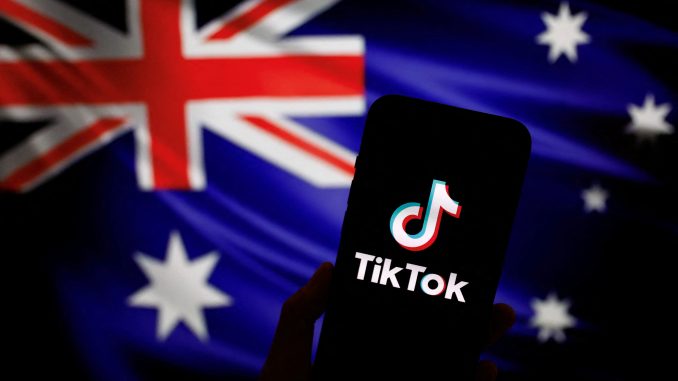
Governments worldwide have been scrutinizing the social media platform TikTok due to mounting concerns regarding national security. Recently, both the United States and Australia have prohibited government employees from using the app, citing potential security threats posed by its Chinese parent company, ByteDance. This action has raised inquiries about the implications of this ban for TikTok’s millions of users and its relationship with the Chinese government.
What you are seeing
In this news feature, we will examine the sequence of events that led to the prohibition of TikTok in the United States and Australia, as well as investigate the political and security concerns that have prompted other countries and government agencies to take action against this popular social media application. To gain further insights into this contentious issue, we will seek expert opinions and commentaries from media and digital security experts. Through our comprehensive analysis, we aim to provide a thorough overview.
Background you need to know
The Chinese-owned short-form video app, TikTok, has become a global sensation in recent years, attracting a huge user base worldwide.
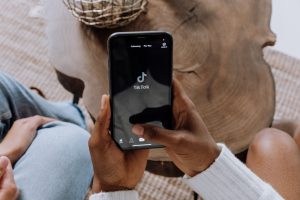
As per SimilarWeb, TikTok currently ranks as the seventh most visited website in the world, with an estimated 1.3 billion monthly visits worldwide as of May 2023.
Social Media News Australia reports that TikTok boasts over 12.8 million monthly active users in Australia alone as of February 2023, making it one of the most popular social media platforms in the country.
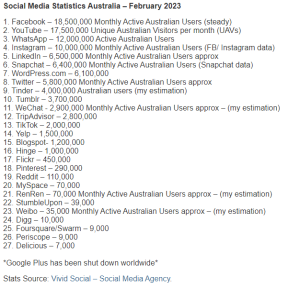
(Social Media Statistics Australia – February 2023)
Despite its immense popularity, TikTok has faced scrutiny from various governments, particularly in Western countries. Lawmakers in the US, Europe, Canada, and Australia have expressed concerns about its Chinese ownership and potential security risks, leading to several countries imposing restrictions or banning the app, especially on government devices.
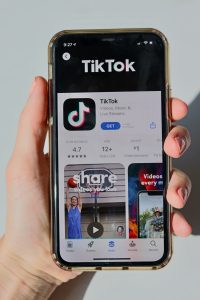
United States’ TikTok ban
The United States’ TikTok ban can be traced back to July 2020, when rumors emerged regarding the possibility of banning the app due to concerns about the Chinese government’s influence over the popular social media platform. To avoid a ban, TikTok put itself up for sale to an American company, appointed an American CEO, and separated its American operations from its parent company. Despite this, in August 2020, President Trump signed an executive order to ban TikTok unless it was sold to an American company within 45 days. TikTok filed an injunction to prevent the ban, and a federal judge blocked the proposed ban in December 2020.
Although the Biden administration dropped Trump’s attempts to ban TikTok in June 2021, reviews of apps like TikTok for security threats continued. In June 2022, TikTok claimed that the Chinese government never accessed US data and transferred its traffic to US-based Oracle servers. However, on December 27, 2022, TikTok was banned from mobile devices of lawmakers and staff in the US House of Representatives. On March 1, 2023, the US House Foreign Affairs Committee granted President Biden approval to ban TikTok, and on March 7, 2023, a bipartisan group of US senators introduced the RESTRICT Act to potentially ban technologies from China, including TikTok.
TikTok CEO Shou Zi Chew testified in front of Congress on March 23, 2023, and on April 14, 2023, Montana became the first state to approve a full, state-wide ban on TikTok.
Australian government takes measures
On April 4, 2023, the Australian government banned the use of TikTok on all government-issued devices due to concerns over data privacy and security. The ban applies to all government departments and agencies, including employees and contractors.
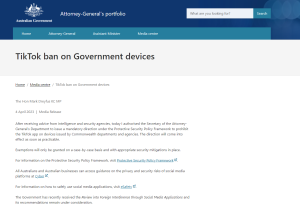
The Attorney-General’s Department issued a policy update and direction on the TikTok application, citing potential risks associated with the app and the need for increased protection of sensitive government information.
In response, the New South Wales government announced on their website that they would comply with the new policy by prohibiting the use of TikTok on all government-issued devices. The statement emphasized the importance of protecting sensitive information and maintaining high levels of cybersecurity in government operations.
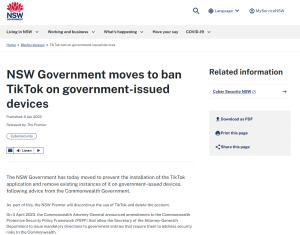
We spoke with Dr. Eric, a telecommunications expert at the University of Queensland, to get insights into the expert views on the ban of TikTok by the U.S. and Australian governments.
According to Dr. Eric, the concerns raised by these governments about data privacy and security are valid. He emphasized that the societal impact of short-form video platforms is still unclear, and geopolitical tensions are at play in the decision to ban TikTok.
“I think the concerns are legitimate; the impact of short-form video platforms on society has yet to be conclusively demonstrated, and there is nothing wrong with maintaining necessary concerns about a rapidly expanding novelty”
He added that this ban is part of a larger trend of countries asserting more control over their internet and digital spaces, which may lead to a bearish outlook for countries in the short term. The ban may discourage tech companies from expanding globally, and there’s a possibility of a digital Cold War between countries with apps and platforms as the battlegrounds. It’s crucial to follow the story’s developments and share opinions on the ban to understand its impact on the global tech industry and digitalization.
“Given the current international situation, it is hard not to link the ban to the political tensions between China and the United States. I think the ban would be understandable if it were simply because of concerns about data privacy. However, it is undeniable that if we blindly bring the cold war thinking into the trend of global digitalization, it will have a serious negative impact on the technological competition and cooperation between different countries, and will affect the process of global digitalization.”
The concerns raised by the U.S. and Australian governments about TikTok are deemed legitimate by Dr. Eric and other experts in the telecommunications field. The impact of short-form video platforms on society has yet to be fully understood, and maintaining necessary concerns about the rapidly expanding novelty is essential.
While the ban on TikTok may not have a significant impact on internet governance and data privacy, it is undoubtedly linked to the political tensions between China and the United States.
Blindly bringing cold war thinking into the trend of global digitalization could have a serious negative impact on technological competition and cooperation between different countries and affect the process of global digitalization.
The ban may also discourage tech companies from expanding globally and lead to a potential digital cold war between countries with apps and platforms as battlegrounds. It is crucial to follow the developments of the story and share our opinions on the matter to ensure that the decisions made are in the best interest of everyone involved.

Be the first to comment